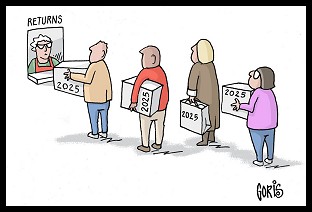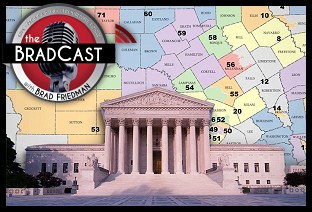 In his April 1963 Letter from a Birmingham Jail, Dr. Martin Luther King, Jr., lamented: "Justice too long delayed is justice denied". No case underscores the civil rights icon's assertion better than the years long fight by North Carolina Republicans to keep unlawfully gerrymandered state and Congressional district maps in place, long after they've been repeatedly found by courts to be in violation of the law and the Constitution.
In his April 1963 Letter from a Birmingham Jail, Dr. Martin Luther King, Jr., lamented: "Justice too long delayed is justice denied". No case underscores the civil rights icon's assertion better than the years long fight by North Carolina Republicans to keep unlawfully gerrymandered state and Congressional district maps in place, long after they've been repeatedly found by courts to be in violation of the law and the Constitution.
The tortured history of Covington v. North Carolina --- a "successful" challenge to the illegal racial gerrymandering of 28 of North Carolina's state House and Senate Districts --- exposes the injustice occasioned by Republican tactical delays. It is a strategy that, thanks to those racial gerrymanders, permitted Tar Heel State Republicans to retain overwhelming majorities in the legislature following last November's General Election –- 34-16 in the state Senate and 74-45 in the House --- even though, in the very same statewide election Democrats Roy Cooper and Joshua Stein were respectively elected governor and attorney general.
But a recent ruling by the U.S. Supreme Court should finally result in new maps, and Special Elections under them, in the Tar Heel State, where the maps have been in place for elections since 2012. Recent legal precedent and a political realignment are on the side of those seeking to force the state to finally carry out those new elections in 2017, rather than waiting for the 2018 mid-terms...
Justice delayed and denied...
Gov. Cooper and Attorney General Stein were elected after the U.S. Supreme Court denied a GOP requested stay of an injunction issued by the U.S. 4th Circuit Court of Appeal in North Carolina Conference of NAACP v. McCrory. In that case, the 4th Circuit struck down a comprehensive GOP voter suppression law that the unanimous appellate panel said had been drafted with "surgical precision" in order to deprive African-Americans of their right to vote.
The federal appellate court found that a Republican state legislature, supported by a Republican governor, enacted "the most restrictive voting law North Carolina has seen since the Jim Crow era." (In a separate case, Cooper v. Harris (May 26, 2017), the U.S. Supreme Court upheld a lower court finding that North Carolina's partisan redistricting of two U.S. Congressional Districts violated the Equal Protection Clause of the U.S. Constitution because race had been a primary factor behind the GOP's gerrymandering in that case as well.)
Disturbingly, the Covington case regarding the racial gerrymandering was initially filed on May 19, 2015. It reveals that many of the Republican legislators, who had sought "with surgical precision" to deprive African-Americans of their right to vote, secured their positions in the North Carolina General Assembly as a result of unlawful racial gerrymandering in 28 state House and Senate Districts. Although, via an Aug. 11, 2016 opinion, the unanimous three-judge District Court panel ruled that the plaintiffs had proven that unlawful racial gerrymander violated the 13th Amendment to the U.S. Constitution, there was insufficient time to remedy that violation prior to the November 8, 2016 general election. It's August 15 injunction applied only to elections conducted after Nov. 8, 2016.
That result was compelled by the U.S. Supreme Court's so-called "Purcell principle", which requires that, because of the risk of uncertainty and potential election day chaos, courts should refrain from ordering last minute changes in election procedures.
On Nov. 29, 2016, the three-judge panel in Covington issued an order directing North Carolina to draw up new redistricting plans by March 15, 2017 with an eye towards Special Elections with primaries to be held in late August or early September, and a November 2017 general election. However, as the District Court observed in its June 9, 2017 Notice: "Rather than submit a proposed redistricting plan, Defendants sought and obtained a stay...pending review of the merits...in the [U.S.] Supreme Court."
On June 5, 2017 the U.S. Supreme Court summarily affirmed the District Court's finding that all 28 districts were the product of illegal racial gerrymandering. Although it vacated the stay of the 2017 Special Elections remedy previously issued by the lower court, the Supremes directed the three-judge District Court panel to weigh equitable factors set forth in its decision so as to redetermine whether the special elections remedy --- the order to hold new elections with new maps this year --- is still appropriate.
The issue now before the three-judge panel is whether this illicitly elected legislative body must now redraw lawfully constituted districts in time for special elections in 2017? The alternative would be to permit those Republican members of the General Assembly to continue to benefit from their unlawful racial gerrymandering scheme until after the Nov. 2018 election. It is a decision that will, in large measure, turn on whether there is sufficient time, per the Purcell principle, to redistrict and schedule both primary and general elections in 2017. On that issue, thanks to the results of last year's gubernatorial election, "prompt" justice may finally be within reach...
Equities and realigned interests point to swift justice
As reflected by the three-judge panel's June 9 Notice, elections have consequences. Last year, when North Carolina chose to seek a Supreme Court stay of the District Court's Nov. 29 decision in the Covington case, rather than move forward with a new redistricting plan, the NC GOP, led by Republican then-Gov. Pat McCrory sought and was granted a Supreme Court stay. The stay was not lifted until June 5 this year. But, by then, McCrory was a "former" governor. Democrats now control the two key positions in the Tar Heel State's executive branch --- governor and attorney general.
The District Court panel's June 9 Notice in Covington reflects that the only parties now opposed to the plaintiffs' June 8 motion to expedite a hearing on whether to schedule new elections in 2017 are Republican state legislators. The "North Carolina Board of Elections takes no position on the motions," the District Court observed, and "the State of North Carolina 'agrees that the public interest calls for a prompt decision on the possibility of a special election in 2017.'"
In its Notice, the District Court not only requested briefs from the parties on the equitable considerations mandated by the Supreme Court's decision, but specifically asked the parties to address "which Defendant, or group of Defendants, has the authority under state law to speak on behalf of the State with regard to the various equitable considerations..."
That issue was previously addressed by Attorney General Stein in a brief that was filed in the Supreme Court in the North Carolina NAACP case --- the case in which the 4th Circuit struck down the NC GOP's massive voter suppression law. Stein, who had previously moved to withdraw North Carolina's petition for a writ of certiorari (the appeal for a hearing before SCOTUS on the matter), argued that the North Carolina General Assembly was not authorized to represent the state and had no authority to hire outside counsel in the case.
When it issued its order denying petition for writ of certiorari in the North Carolina NAACP case, Chief Justice John Roberts complained of "the blizzard of filings over who is and who is not authorized to seek review in this Court under North Carolina law."
It is difficult to imagine a circumstance in which the federal District Court panel would side with the General Assembly and against Gov. Cooper if the Attorney General provides a convincing argument that the state can complete the necessary redistricting so as to facilitate primary and general elections in 2017 --- especially since those Republicans who oppose such an order seek to retain positions within the General Assembly that are the product of illegal racial gerrymandering. After all, we are talking about the same Republican legislators who opted to seek and obtain a stay rather than comply with the panel's Nov. 29 order last year to draw up new districting plans by March 15 of this year.
It is likely that, at that point, the District Court panel will conclude that any further delay is justice denied.
UPDATE: When interviewed on WFAE, Charlotte's NPR news source, Gov. Cooper said he didn't think North Carolina "should have another budget pass or another legislative session" until the unlawful racial districting lines were fixed. He noted that "the Republican leadership is dragging its feet on drawing these maps," and suggested that Republicans might, at the eleventh hour, present maps that would again reflect an unconstitutional racial gerrymander. He suggested that it would be better if the court drew up the maps rather than simply provide the Republicans with another timeline.
But that may be an onerous task to impose upon the court. Perhaps a better course would be for the governor, the attorney general and attorneys for the plaintiffs to draw-up their own proposed maps and submit them to the court for approval. That could insure a timely resolution.


 'Green News Report' 1/6/26
'Green News Report' 1/6/26
 Trump's War on Venezuela is About Ego, Power, Creation of 'Alien Enemies': 'BradCast' 1/5/26
Trump's War on Venezuela is About Ego, Power, Creation of 'Alien Enemies': 'BradCast' 1/5/26 Sunday 'Peace President' Toons
Sunday 'Peace President' Toons Sunday 'Many Happy Returns' Toons
Sunday 'Many Happy Returns' Toons Have a Holly Jolly Somehow
Have a Holly Jolly Somehow 'Tis the Sunday Before Christmas Toons
'Tis the Sunday Before Christmas Toons Old Man Shouts at People from White House for 20 Minutes, and Other Year-End Matters: 'BradCast' 12/18/25
Old Man Shouts at People from White House for 20 Minutes, and Other Year-End Matters: 'BradCast' 12/18/25 'Green News Report' 12/18/25
'Green News Report' 12/18/25 SCOTUS Ruling a How-To for Unlawful Gerrymandering on 'Eve' of Critical Election Year: BradCast' 12/17/25
SCOTUS Ruling a How-To for Unlawful Gerrymandering on 'Eve' of Critical Election Year: BradCast' 12/17/25 Bricks in the Wall: 'BradCast' 12/16/25
Bricks in the Wall: 'BradCast' 12/16/25 'Green News Report' 12/16/25
'Green News Report' 12/16/25 'This One Goes to 11': Weekend of Violence, Murder of Rob Reiner: 'BradCast' 12/15
'This One Goes to 11': Weekend of Violence, Murder of Rob Reiner: 'BradCast' 12/15 Sunday 'WTF?' Toons
Sunday 'WTF?' Toons Trump Now Losing One Battle After Another: 'BradCast' 12/11/25
Trump Now Losing One Battle After Another: 'BradCast' 12/11/25 'Green News Report' 12/11/25
'Green News Report' 12/11/25 Dems Continue Stunning 2025 Election Streak: 'BradCast' 12/10/25
Dems Continue Stunning 2025 Election Streak: 'BradCast' 12/10/25 Petrostates and Propa-gandists Undermining Climate Science: 'BradCast' 12/9/25
Petrostates and Propa-gandists Undermining Climate Science: 'BradCast' 12/9/25 The High Cost of Trump's Terrible Policy Making: 'BradCast' 12/8/25
The High Cost of Trump's Terrible Policy Making: 'BradCast' 12/8/25 Dems Fight to Avoid GOP's Year-End Health Care Cliff: 'BradCast' 12/4/25
Dems Fight to Avoid GOP's Year-End Health Care Cliff: 'BradCast' 12/4/25 A 'Flashing Red Warning Sign' for GOP: 'BradCast' 12/3/25
A 'Flashing Red Warning Sign' for GOP: 'BradCast' 12/3/25 Hegseth, War Crimes and DoD's 'Politicization Death Spiral': 'BradCast' 12/2/25
Hegseth, War Crimes and DoD's 'Politicization Death Spiral': 'BradCast' 12/2/25 Follow the
Follow the  With Thanks, No Kings and Good Cheer
With Thanks, No Kings and Good Cheer
 VA GOP VOTER REG FRAUDSTER OFF HOOK
VA GOP VOTER REG FRAUDSTER OFF HOOK Criminal GOP Voter Registration Fraud Probe Expanding in VA
Criminal GOP Voter Registration Fraud Probe Expanding in VA DOJ PROBE SOUGHT AFTER VA ARREST
DOJ PROBE SOUGHT AFTER VA ARREST Arrest in VA: GOP Voter Reg Scandal Widens
Arrest in VA: GOP Voter Reg Scandal Widens ALL TOGETHER: ROVE, SPROUL, KOCHS, RNC
ALL TOGETHER: ROVE, SPROUL, KOCHS, RNC LATimes: RNC's 'Fired' Sproul Working for Repubs in 'as Many as 30 States'
LATimes: RNC's 'Fired' Sproul Working for Repubs in 'as Many as 30 States' 'Fired' Sproul Group 'Cloned', Still Working for Republicans in At Least 10 States
'Fired' Sproul Group 'Cloned', Still Working for Republicans in At Least 10 States FINALLY: FOX ON GOP REG FRAUD SCANDAL
FINALLY: FOX ON GOP REG FRAUD SCANDAL COLORADO FOLLOWS FLORIDA WITH GOP CRIMINAL INVESTIGATION
COLORADO FOLLOWS FLORIDA WITH GOP CRIMINAL INVESTIGATION CRIMINAL PROBE LAUNCHED INTO GOP VOTER REGISTRATION FRAUD SCANDAL IN FL
CRIMINAL PROBE LAUNCHED INTO GOP VOTER REGISTRATION FRAUD SCANDAL IN FL Brad Breaks PA Photo ID & GOP Registration Fraud Scandal News on Hartmann TV
Brad Breaks PA Photo ID & GOP Registration Fraud Scandal News on Hartmann TV  CAUGHT ON TAPE: COORDINATED NATIONWIDE GOP VOTER REG SCAM
CAUGHT ON TAPE: COORDINATED NATIONWIDE GOP VOTER REG SCAM CRIMINAL ELECTION FRAUD COMPLAINT FILED AGAINST GOP 'FRAUD' FIRM
CRIMINAL ELECTION FRAUD COMPLAINT FILED AGAINST GOP 'FRAUD' FIRM RICK SCOTT GETS ROLLED IN GOP REGISTRATION FRAUD SCANDAL
RICK SCOTT GETS ROLLED IN GOP REGISTRATION FRAUD SCANDAL VIDEO: Brad Breaks GOP Reg Fraud Scandal on Hartmann TV
VIDEO: Brad Breaks GOP Reg Fraud Scandal on Hartmann TV RNC FIRES NATIONAL VOTER REGISTRATION FIRM FOR FRAUD
RNC FIRES NATIONAL VOTER REGISTRATION FIRM FOR FRAUD EXCLUSIVE: Intvw w/ FL Official Who First Discovered GOP Reg Fraud
EXCLUSIVE: Intvw w/ FL Official Who First Discovered GOP Reg Fraud GOP REGISTRATION FRAUD FOUND IN FL
GOP REGISTRATION FRAUD FOUND IN FL

































